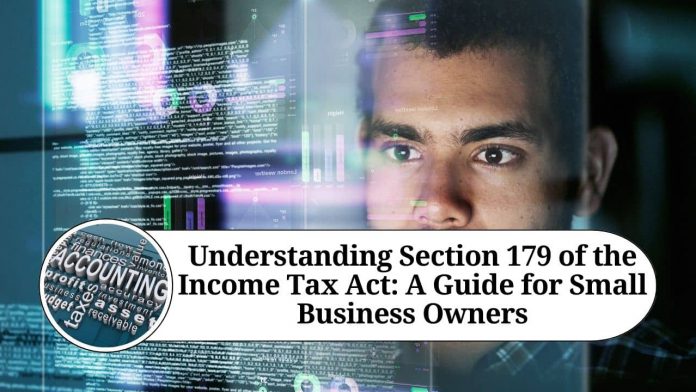Understanding Section 179 of the Income Tax Act
As a business owner, understanding the tax laws that affect your company is critical. One of the most important provisions for businesses to be aware of is Section 179 of the Income Tax Act. In this blog post, we will explore what Section 179 is, how it works, and its benefits to small business owners.
What is Section 179?
Section 179 of the Income Tax Act allows businesses to deduct the full purchase price of qualifying equipment and/or software purchased or leased during the tax year. This deduction is intended to encourage businesses to invest in themselves and grow their operations.
How does it work?
When a business purchases or leases qualifying equipment, they can choose to expense the full cost of the equipment in the same year it was purchased, instead of depreciating the cost over several years. This means that the business can deduct the entire cost of the equipment from their taxable income, up to a limit set by the IRS.
What are the benefits of Section 179?
- Increased cash flow: By allowing businesses to deduct the full cost of equipment in the year of purchase, Section 179 provides a significant boost to cash flow. This can be especially beneficial for small businesses that may not have large reserves of cash to invest in new equipment.
- Reduced tax liability: By deducting the full cost of qualifying equipment, businesses can lower their taxable income and reduce their overall tax liability.
- Encourages investment: Section 179 is designed to encourage businesses to invest in themselves by purchasing new equipment and software. This, in turn, can lead to increased productivity, improved efficiency, and higher profits.
What equipment qualifies for Section 179?
To qualify for Section 179, the equipment must be tangible, depreciable property that is used for business purposes more than 50% of the time. This can include items such as:
- Machinery and equipment
- Computers and software
- Office furniture and equipment
- Vehicles used for business purposes
- Property attached to a building (such as heating and air conditioning systems)
What are the limits of Section 179?
The IRS sets a limit on the amount that can be deducted under Section 179 each year. For the 2022 tax year, this limit is $1,050,000. Additionally, the total cost of the equipment purchased or leased cannot exceed $2,620,000. If the cost of the equipment exceeds this amount, the deduction is reduced on a dollar-for-dollar basis.
Some additional information about Section 179 that may be helpful to business owners includes:
Eligible Entities: Section 179 is available to any business that purchases, finances or leases qualifying equipment. This includes sole proprietors, partnerships, LLCs, corporations, and even certain trusts.
New and Used Equipment: Section 179 can be used for both new and used equipment. However, it must be new to you – meaning that you cannot take the deduction on equipment that you previously owned and then sold.
Bonus Depreciation: In addition to Section 179, the IRS also offers bonus depreciation, which allows businesses to depreciate 100% of the cost of eligible property in the year it is placed in service. Bonus depreciation is available for both new and used property, and there is no limit on the amount that can be depreciated.
State Tax Laws: While Section 179 is a federal tax law, it is important to note that state tax laws may vary. Some states conform to the federal law, while others have their own limits and regulations for equipment deductions.
Record Keeping: To take advantage of Section 179, it is important to keep accurate records of equipment purchases and leases. This includes documentation of the purchase price, date of purchase, and description of the equipment. Proper record keeping can help to ensure compliance with IRS regulations and prevent any issues during an audit.
Additional information about Section 179 that businesses should be aware of includes:
Qualifying Leasehold Improvements: Prior to the Tax Cuts and Jobs Act of 2017, leasehold improvements were not eligible for Section 179. However, under the new law, businesses can now take advantage of the deduction for certain qualified leasehold improvements, including improvements to non-residential real property such as retail space, office buildings, and restaurants.
Section 179 and Section 168: Businesses can choose to take advantage of both Section 179 and Section 168 of the Income Tax Act. Section 168 allows for depreciation deductions over the useful life of the property, while Section 179 allows for an immediate deduction of the cost of qualifying equipment. It is important to work with a tax professional to determine the best strategy for maximizing deductions under both sections.
Mid-Year Purchases: If a business purchases qualifying equipment during the tax year, they can choose to take the full Section 179 deduction even if the equipment was purchased late in the year. However, if the equipment was not in use before the end of the year, the deduction may need to be adjusted.
Section 179 Carryover: If the cost of qualifying equipment exceeds the yearly limit for Section 179, the excess can be carried over to the next tax year. This can be helpful for businesses that are planning to make larger equipment purchases in the future.
Conclusion:
Overall, Section 179 of the Income Tax Act provides a valuable opportunity for businesses to reduce their tax liability and increase cash flow by expensing the cost of qualifying equipment in the year of purchase. However, it is important to understand the limitations and regulations of the deduction and to work with a qualified tax professional to ensure compliance with all IRS guidelines. By taking advantage of Section 179, businesses can invest in themselves and increase their productivity and profitability.
Other Related Blogs: Section 144B Income Tax Act




















